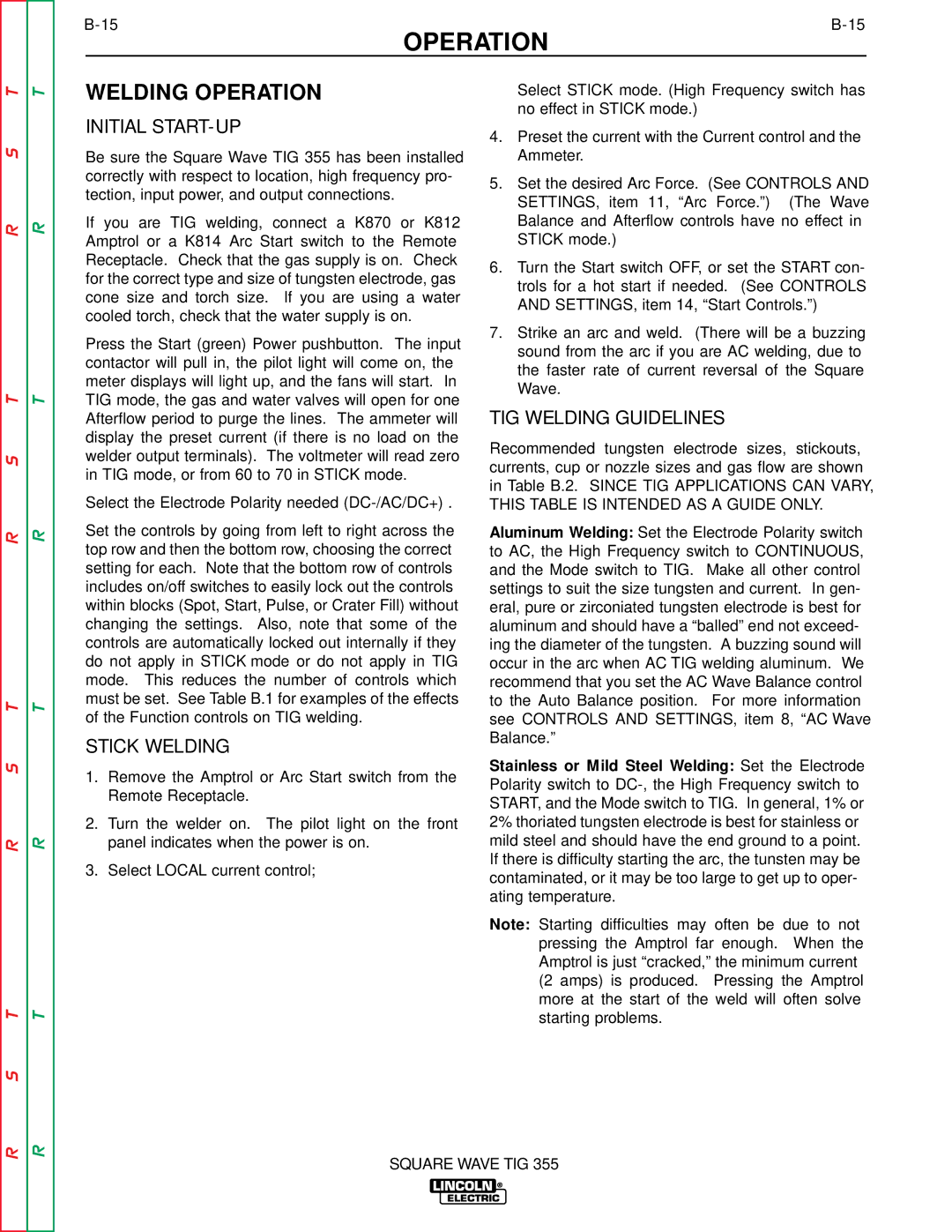
TOC
|
| OPERATION |
| WELDING OPERATION | Select STICK mode. (High Frequency switch has |
|
| no effect in STICK mode.) |
Return to Section
Return to Section TOC
Return to Section TOC
Return to Section TOC
Return to Master
Return to Master TOC
Return to Master TOC
Return to Master TOC
INITIAL START-UP
Be sure the Square Wave TIG 355 has been installed correctly with respect to location, high frequency pro- tection, input power, and output connections.
If you are TIG welding, connect a K870 or K812 Amptrol or a K814 Arc Start switch to the Remote Receptacle. Check that the gas supply is on. Check for the correct type and size of tungsten electrode, gas cone size and torch size. If you are using a water cooled torch, check that the water supply is on.
Press the Start (green) Power pushbutton. The input contactor will pull in, the pilot light will come on, the meter displays will light up, and the fans will start. In TIG mode, the gas and water valves will open for one Afterflow period to purge the lines. The ammeter will display the preset current (if there is no load on the welder output terminals). The voltmeter will read zero in TIG mode, or from 60 to 70 in STICK mode.
Select the Electrode Polarity needed
Set the controls by going from left to right across the top row and then the bottom row, choosing the correct setting for each. Note that the bottom row of controls includes on/off switches to easily lock out the controls within blocks (Spot, Start, Pulse, or Crater Fill) without changing the settings. Also, note that some of the controls are automatically locked out internally if they do not apply in STICK mode or do not apply in TIG mode. This reduces the number of controls which must be set. See Table B.1 for examples of the effects of the Function controls on TIG welding.
STICK WELDING
1.Remove the Amptrol or Arc Start switch from the Remote Receptacle.
2.Turn the welder on. The pilot light on the front panel indicates when the power is on.
3.Select LOCAL current control;
4.Preset the current with the Current control and the Ammeter.
5.Set the desired Arc Force. (See CONTROLS AND SETTINGS, item 11, “Arc Force.”) (The Wave Balance and Afterflow controls have no effect in STICK mode.)
6.Turn the Start switch OFF, or set the START con- trols for a hot start if needed. (See CONTROLS AND SETTINGS, item 14, “Start Controls.”)
7.Strike an arc and weld. (There will be a buzzing sound from the arc if you are AC welding, due to the faster rate of current reversal of the Square Wave.
TIG WELDING GUIDELINES
Recommended tungsten electrode sizes, stickouts, currents, cup or nozzle sizes and gas flow are shown in Table B.2. SINCE TIG APPLICATIONS CAN VARY,
THIS TABLE IS INTENDED AS A GUIDE ONLY.
Aluminum Welding: Set the Electrode Polarity switch to AC, the High Frequency switch to CONTINUOUS, and the Mode switch to TIG. Make all other control settings to suit the size tungsten and current. In gen- eral, pure or zirconiated tungsten electrode is best for aluminum and should have a “balled” end not exceed- ing the diameter of the tungsten. A buzzing sound will occur in the arc when AC TIG welding aluminum. We recommend that you set the AC Wave Balance control to the Auto Balance position. For more information see CONTROLS AND SETTINGS, item 8, “AC Wave Balance.”
Stainless or Mild Steel Welding: Set the Electrode Polarity switch to
Note: Starting difficulties may often be due to not pressing the Amptrol far enough. When the Amptrol is just “cracked,” the minimum current (2 amps) is produced. Pressing the Amptrol more at the start of the weld will often solve starting problems.
SQUARE WAVE TIG 355
